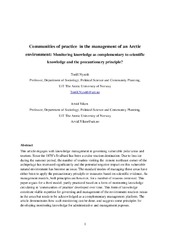Blar i forfatter "Nyseth, Torill"
-
Communities of practice in the management of an Arctic environment: monitoring knowledge as complementary to scientific knowledge and the precautionary principle?
Nyseth, Torill; Viken, Arvid (Journal article; Tidsskriftartikkel; Peer reviewed, 2015-06-03)This article engages with knowledge management in governing vulnerable polar areas and tourism. Since the 1870’s Svalbard has been a cruise tourism destination. Due to less ice during the summer period, the number of tourists visiting the remote northeast corner of the archipelago has increased significantly and the potential negative impact on this vulnerable natural environment has become an ... -
Dealing with difference: Contested place identities in two northern Scandinavian cities
Hudson, Christine; Nyseth, Torill; Pedersen, Paul (Journal article; Tidsskriftartikkel; Peer reviewed, 2019-11-05)In an era of culturally driven growth, urban identities are of central importance for the branding of cities. However, urban identities are under constant re-negotiation as cities’ populations become more diverse. In northern Scandinavia, some cities have developed on what were traditionally Indigenous lands but have failed to acknowledge the role these roots and histories have played in shaping the ... -
Diversity Policies as Tools to Increase Participation and Encounters.
Nyseth, Torill (Journal article; Tidsskriftartikkel; Peer reviewed, 2021-12-02)Informed by the concept of diversity, this article discusses the issue of municipalities’ facilitation of ethnic diversity and integration in two cities in northern Norway. Municipalities are in a position to accommodate ethnic diversity in more pragmatic ways than the nation-state through local policies. We explore diversity policies in three different areas: democratic participation, urban planning, ... -
The heterogneity of the Arctic
Nyseth, Torill; Christensen, Julia (Chapter; Bokkapittel, 2023-12-20)New forms of urbanization are unfolding around the world that challenge inherited conceptions of the urban as a fixed and universally generalizable settlement type. The Arctic is a region where urbanization is a strong and powerful process. Inspired by Neil Brenner`s concept of planetary urbanism, this chapter seeks to challenge dominant paradigms that locate Arctic space and place outside urban ... -
Innovative Forms of Citizen Participation at the Fringe of the Formal Planning System
Nyseth, Torill; Ringholm, Toril Merete; Agger, Annika (Journal article; Tidsskriftartikkel; Peer reviewed, 2019-01-24)In the Nordic countries, we are witnessing a proliferation of novel and more experimental ways of citizen and authority interaction within the field of urban planning and governance. These formats are seen in urban regeneration projects and planning experiments that endorse more inclusive interactions between public authorities and local actors than in the traditional formal hearings. The intention ... -
Participation according to the law? The research-based knowledge on citizen participation in Norwegian municipal planning
Ringholm, Toril M; Nyseth, Torill; Hanssen, Gro Sandkjær (Journal article; Tidsskriftartikkel; Peer reviewed, 2018-08-15)Citizen participation is enshrined in the Norwegian Planning and Building Act (PBA) 1985 and accentuated by the 2008 revision of the PBA. In this article, we ask if the research on participation in municipal planning is sufficient to draw conclusions on whether the Act is effective with regard to both the spirit and the letter of the law. The guiding framework for the analysis is based on the ... -
The transformative power of social innovation in urban planning and local development
Nyseth, Torill; Hamdouch, Abdelillah (Journal article; Tidsskriftartikkel; Peer reviewed, 2019-01-24)This issue discusses the concept of social innovation (SI) as a potentially transformative factor in urban planning and local development. SI represents an alternative to economic and technology-oriented approaches to urban development, such as that of ‘smart cities’, ‘creative cities’, etc. This is thanks to the emphasis SI puts on human agency and the empowerment of local communities and citizens ...


 English
English norsk
norsk





